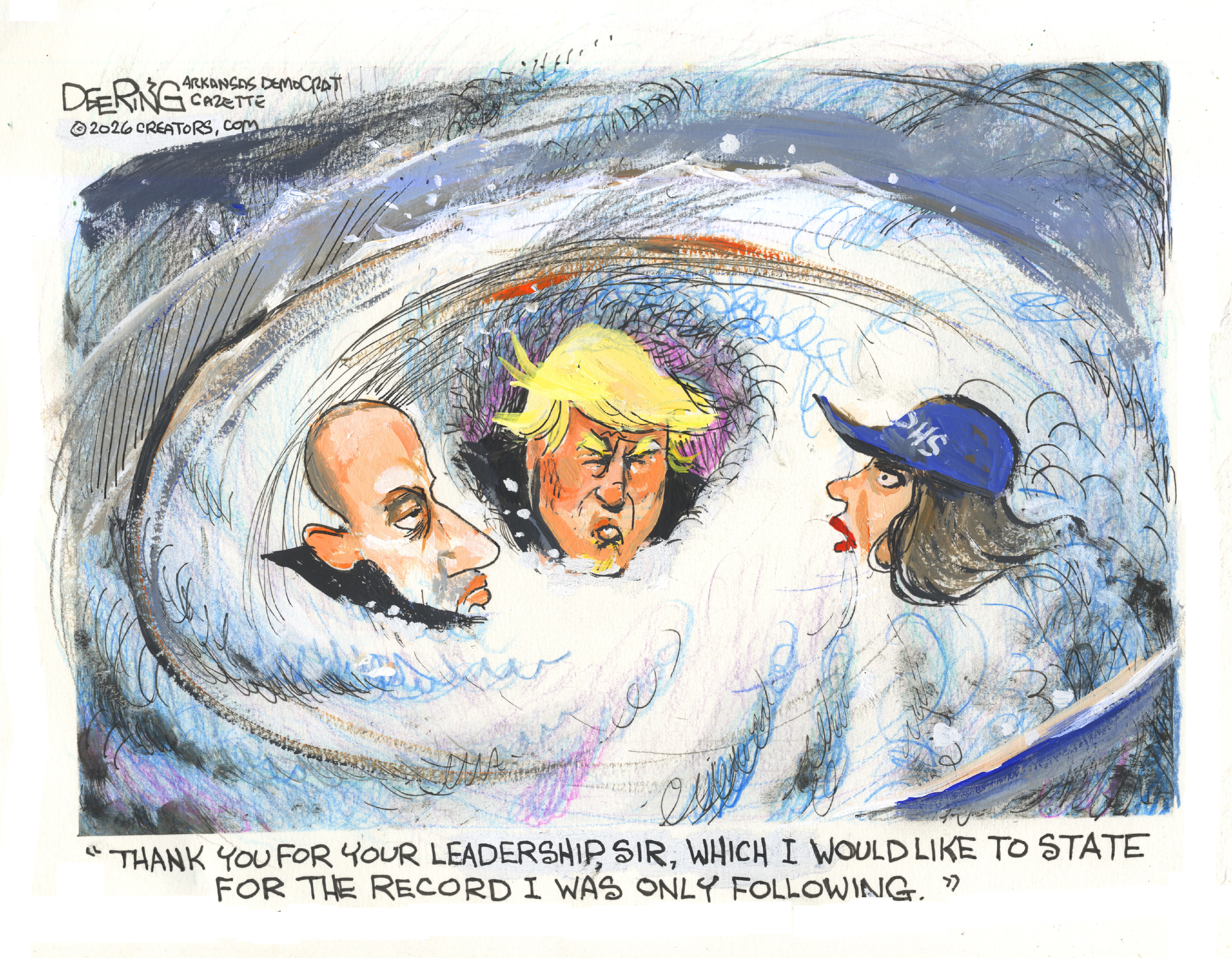The NAFTA reboot could be Trump's greatest victory
The USMCA is already better than NAFTA. Will Democrats ever learn to love it?


A free daily email with the biggest news stories of the day – and the best features from TheWeek.com
You are now subscribed
Your newsletter sign-up was successful
The seriousness of the possible end of the North American Free Trade Agreement cannot be overstated. It is far more consequential than the public and private fortunes of a Supreme Court nominee who should have been withdrawn weeks ago. The ratification of NAFTA in 1994 over the protests of virtually every labor union in the country changed the United States forever. It exacerbated the decline of industrial America and began the remaking of the rest of the world in the image of deracinated neoliberalism. Along with George W. Bush's awarding of "Most Favored Nation" status to China, it cemented seemingly for good the economic trends — the decrease in real wages, the end of lifetime employment, the decline of union power outside the public sector — that since the Carter administration had been transforming the United States from a mixed economy with quasi-nationalized industries and a strong welfare state to a libertarian-lite corporate dystopia.
President Trump's NAFTA-replacing deal with Canada and Mexico is very new. It is impossible in the space of only a day or two to review its proposed language, which runs to many thousands of words on every conceivable subject on which the interests of two or more of the member countries might intersect. There are four-page PDFs ("Subject to Legal Review for Accuracy, Clarity, and Consistency; Subject to Language Authentication") reproducing correspondence between the Mexican economic secretary and Robert Lighthizer, the U.S. trade representative, expressing tentative agreement on the consequences of pan-American cross-marketing of some 25 different varieties of cheese. The whole thing is head-spinningly complicated and emphatically not the sort of thing about which cheap moralizing journalism can be produced.
And yet it is already possible to argue beyond any doubt that the new USMCA is an improvement over NAFTA. Whether it’s the requirement that in order to be subject to zero tariffs 75 percent of an automobile's components must be made in one of the three member countries or the stipulation that 40 percent of the work involved in manufacturing cars must be done by workers making at least $16 an hour — more than three times the daily minimum wage in Mexico — or the improved protections for the environment, worker safety, and collective bargaining, there is not a single area in which the United States-Mexico-Canada Agreement is not superior to what came before it.
The Week
Escape your echo chamber. Get the facts behind the news, plus analysis from multiple perspectives.

Sign up for The Week's Free Newsletters
From our morning news briefing to a weekly Good News Newsletter, get the best of The Week delivered directly to your inbox.
From our morning news briefing to a weekly Good News Newsletter, get the best of The Week delivered directly to your inbox.
Is it perfect? No. But after two and a half decades it is time to accept what is on the table.
The most important thing about USMCA is also, to my mind, the most surprising. This is the fact that, aspirationally and at times even directly, it concerns itself not with shoring up the fortunes of the United States but rather with the well-being of workers regardless of what country they live in. NAFTA created a system in which the wealthy of all three member nations got richer while the working and middle classes were told to be content with cheap consumer goods. Those of us who opposed it did so not simply because we would like to see jobs stay in the United States, where workers receive higher wages and better benefits and a safer work environment than in Mexico and the right — at least outside of the South and, alas, parts of the Midwest — to bargain collectively already, but because laborers in all countries deserve to be treated fairly.
It is difficult to say whether this new deal will come off. There is a very real possibility that the agreement will be taken up by a Democratic Congress next year. Would Democrats really deny workers in the United States, Canada, and Mexico increased protections? Would they really sell out labor unions and the environment and farmers and loggers in order to deny President Trump something to put in his W column ahead of the 2020 election? Of course they would.
It would not even necessarily be partisan, at least not in such a narrowly cynical sense. Support for unlimited free trade is a cornerstone of both of our major political parties. NAFTA was rammed through by a Democratic president working with a Republican Congress. Barack Obama was for renegotiating the agreement in 2004, but by the end of his second term pushing through an East Asian clone of NAFTA was almost his sole economic priority. Only a handful of progressive outliers among Democrats — Rep. Rosa DeLauro (Conn.) is the most honorable example — have been consistent critics of our trade relations. There is no reason in the world to think that the others will change their minds now that the president many of them hope to impeach would stand to gain from it.
A free daily email with the biggest news stories of the day – and the best features from TheWeek.com
If USMCA is ratified by the Senate, it will almost certainly be President Trump's greatest political victory. If it is not, he should test the limits of his executive authority and join it anyway, as Obama did with the Iran nuclear deal. The economic future of an entire continent is too important to be left to the whims of cynical legislators.
Matthew Walther is a national correspondent at The Week. His work has also appeared in First Things, The Spectator of London, The Catholic Herald, National Review, and other publications. He is currently writing a biography of the Rev. Montague Summers. He is also a Robert Novak Journalism Fellow.
-
 6 gorgeous homes in warm climes
6 gorgeous homes in warm climesFeature Featuring a Spanish Revival in Tucson and Richard Neutra-designed modernist home in Los Angeles
-
 Russia’s ‘cyborg’ spy pigeons
Russia’s ‘cyborg’ spy pigeonsUnder the Radar Moscow neurotech company with Kremlin-linked funding claims to implant neural chips in birds’ brains to control their flight, and create ‘bio-drones’
-
 Political cartoons for February 8
Political cartoons for February 8Cartoons Sunday’s political cartoons include going down the drain, American history, and more
-
 The billionaires’ wealth tax: a catastrophe for California?
The billionaires’ wealth tax: a catastrophe for California?Talking Point Peter Thiel and Larry Page preparing to change state residency
-
 Bari Weiss’ ‘60 Minutes’ scandal is about more than one report
Bari Weiss’ ‘60 Minutes’ scandal is about more than one reportIN THE SPOTLIGHT By blocking an approved segment on a controversial prison holding US deportees in El Salvador, the editor-in-chief of CBS News has become the main story
-
 Has Zohran Mamdani shown the Democrats how to win again?
Has Zohran Mamdani shown the Democrats how to win again?Today’s Big Question New York City mayoral election touted as victory for left-wing populists but moderate centrist wins elsewhere present more complex path for Democratic Party
-
 Millions turn out for anti-Trump ‘No Kings’ rallies
Millions turn out for anti-Trump ‘No Kings’ ralliesSpeed Read An estimated 7 million people participated, 2 million more than at the first ‘No Kings’ protest in June
-
 Ghislaine Maxwell: angling for a Trump pardon
Ghislaine Maxwell: angling for a Trump pardonTalking Point Convicted sex trafficker's testimony could shed new light on president's links to Jeffrey Epstein
-
 The last words and final moments of 40 presidents
The last words and final moments of 40 presidentsThe Explainer Some are eloquent quotes worthy of the holders of the highest office in the nation, and others... aren't
-
 The JFK files: the truth at last?
The JFK files: the truth at last?In The Spotlight More than 64,000 previously classified documents relating the 1963 assassination of John F. Kennedy have been released by the Trump administration
-
 'Seriously, not literally': how should the world take Donald Trump?
'Seriously, not literally': how should the world take Donald Trump?Today's big question White House rhetoric and reality look likely to become increasingly blurred
